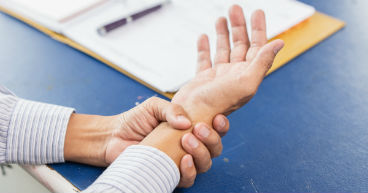
If you have accidentally leaked urine when sneezing, coughing or exerting yourself, it may leave you feeling embarrassed or ashamed. Urinary incontinence (UI), the inability to control urination, may have a significant impact on your quality of life. Anxiety about urine leakage may keep you from doing things you love, such as dining out or playing sports. But know this: you are not alone. About half of all adult women and one quarter of adult men experience some symptoms of UI.
UI is a common side effect of some cancers and treatments, especially those involving the prostate, bladder and reproductive organs. Sometimes, cancer and its treatment may affect bladder function by changing the nerves and muscles used to control urine flow. A prostatectomy (removal of the prostate), for instance, may affect the valves of the bladder and disrupt the way it holds urine. Also, certain medications, such as some blood pressure medications and antidepressants, may cause UI.
Symptoms of UI
UI symptoms may range from leaking a little urine to a total lack of urination control. Potential symptoms of UI include:
- Getting up often during the night to urinate
- Leaking urine during activities
- Not being able to hold your urine
- Taking a long time to urinate
- Urinating small amounts
- Feeling the bladder is never empty
- Having a weak urine stream
Types of UI
Some types of urinary incontinence include:
Stress incontinence occurs from weakened or damaged urethral, sphincter or pelvic floor muscles. It causes small amounts of urine to leak from coughing, sneezing, laughing, lifting objects, rising from a chair, and other physical movements.
Urge incontinence occurs when the bladder contracts too often. It causes a large amount of urine to leak at unexpected times, such as during sleep, often with a strong, sudden urge to urinate.
Overflow incontinence occurs when the bladder overfills. It causes small amounts of urine to leak frequently throughout the day.
Overactive bladder occurs when the bladder's muscle contracts involuntarily. It causes urinary frequency and urgency.
Mixed incontinence occurs as a combination of several types of incontinence, usually stress and urge incontinence.
Transient incontinence occurs as a temporary incontinence, because of a situation that will pass, such as infection, a new medication, or severe constipation.
Tips to manage UI
Treatment for UI depends on the type, severity, and cause of the problem, and may include a combination of approaches. Additionally, there are products available, such as absorbent pads, to help hide any leakage that occurs so you can remain active and comfortable. UI may be temporary or permanent, depending on the type of treatment you received and the extent of the damage. But, even if your incontinence cannot be completely corrected, you may learn how to manage it so you can continue to participate in activities you enjoy.
Here are some tips to help you manage UI:
Stick to a urination schedule. Setting routine times to urinate (e.g., every two hours) may help retrain the bladder. Instead of waiting for your bladder to feel full, use the bathroom at regular timed intervals. After you've finished urinating, relax for a few moments, and then urinate again. Timed urination helps keep the bladder empty. Remember that it may take some time to find a schedule that works for you.
Keep a bladder diary. A bladder diary may be a useful tool to identify the type of incontinence you have. Keep a record of what you drank and what time you drank it. Also record how many times you urinated, as well as any urine-leaking episodes and what led up to it. Bring the diary to your doctor, who may be able to see a pattern and provide treatment recommendations.
Prepare ahead. Empty your bladder (even if you don’t think you need to) before leaving the house, getting in the car, or going to bed. Locate bathrooms when you arrive at places outside of your home, such as restaurants. Also, clear your path of obstacles so you can get to the restroom faster and easier. Wear clothes that are easily removed, such as pants with elastic waistbands. Women may find it helps to wear a tampon during activities, as it puts pressure on the urethra to prevent leakage.
Try bladder retraining techniques. Bladder retraining may help increase your bladder capacity so it can hold more urine for longer periods of time. Instead of urinating whenever you feel the urge, try to wait a few minutes and gradually lengthen the time between bathroom trips. You may aim to urinate at set times of the day, such as once every hour, and eventually build up to once every three to four hours.
Strengthen your pelvic muscles. Pelvic floor exercises, called Kegels, may help strengthen the muscles that control urination. Try to tighten the muscles you use to start and stop the flow of urination, hold for a count of three, and then release. Gradually work up to three sets of 10 repeats in different positions (lying down, sitting, or standing). Your health care team may advise how to perform the exercises correctly.
Balance your fluid intake. It’s important to maintain a healthy balance of fluids. Drinking too much fluid may cause bladder leakage. Not drinking enough fluid may cause dehydration, which may irritate your bladder and further aggravate UI. Try to drink small amounts throughout the day, rather than large amounts at one time. Also, drink more at the start of the day and less before you go to bed.
Stay away from certain vices. Alcohol and caffeine may be irritating to the bladder. To reduce urination urgency, it’s important to limit your intake of alcoholic beverages and caffeinated drinks, such as coffee, tea, and some carbonated drinks. Also, don’t smoke. Not only is smoking discouraged for health reasons, it may lead to coughing, which may exacerbate urine leakage.
Make dietary modifications. Some foods may irritate your bladder and aggravate UI. Limit your intake of dairy products, acidic foods (e.g., citrus fruits, tomatoes), spicy foods, vinegars, chocolate, sugar, and artificial sweeteners. Drink more water, apple juice, grape juice, and cranberry juice. If constipation is a problem, increase the amount of fiber in your diet.
Maintain a healthy lifestyle. Since obesity may increase the risk of urine leakage, it’s important to maintain a healthy weight. And, although you may not want to exercise for fear of urine leakage, try to get in some regular physical activity. You may also consider joining a support group to share your feelings with others in similar situations.
Talk with your doctor. In order to find the best treatment for UI, it’s important to keep the lines of communication open with your doctor. Talk with your doctor about the medications you are taking, as some of them may make your incontinence worse. Remember, there is no one right way to cope with incontinence. You need to find what works best for you.
Get tips to help manage taste changes during cancer treatment.


